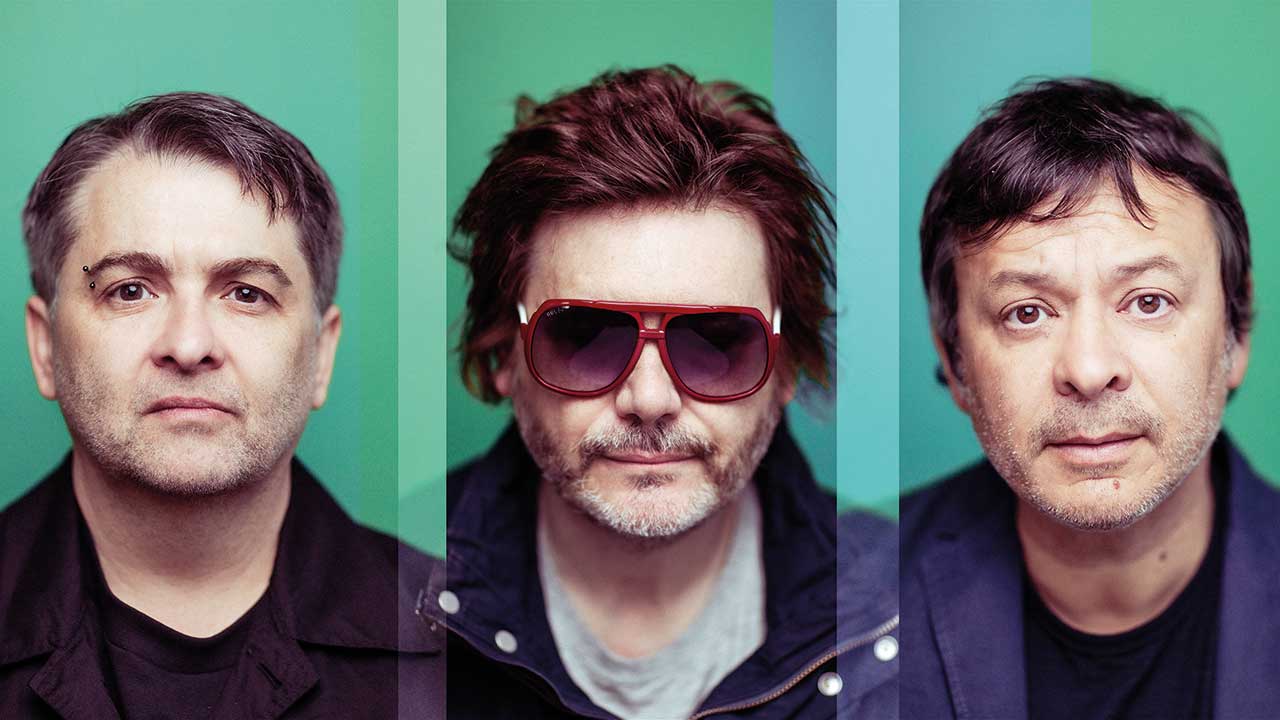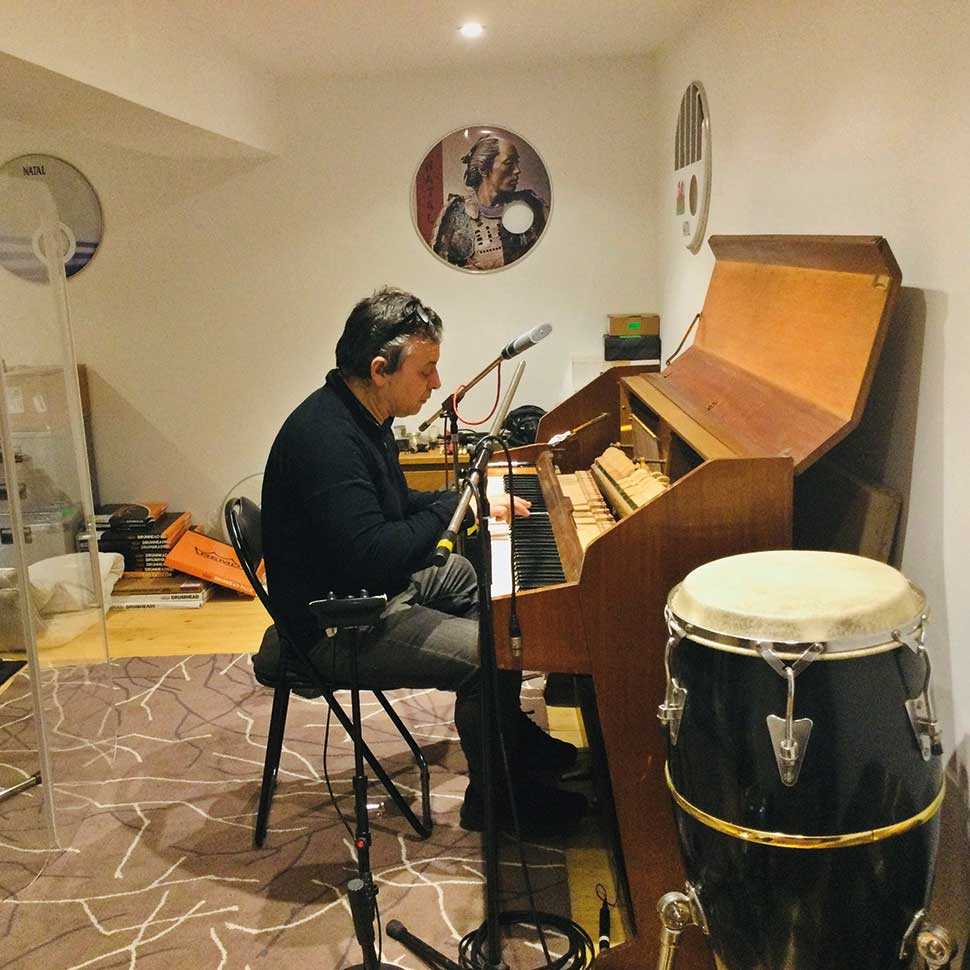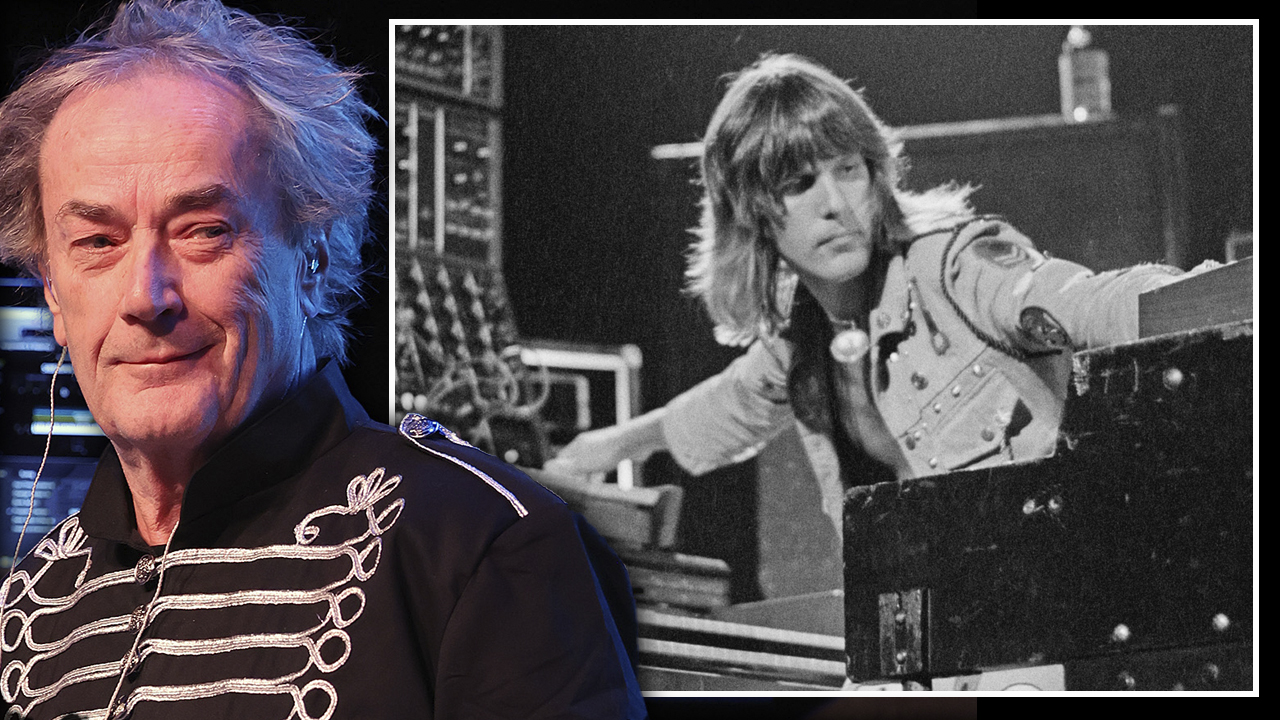How Manic Street Preachers mined their youth and made The Ultra Vivid Lament
With Manic Street Preachers having have undergone their fair share of emotional upheaval recently, it’s little wonder new album The Ultra Vivid Lament has its melancholic side

Select the newsletters you’d like to receive. Then, add your email to sign up.
You are now subscribed
Your newsletter sign-up was successful
Want to add more newsletters?
Margaret entered James Dean Bradfield’s life just before lockdown. Named after its previous owner, the hundred-year-old piano arrived on his doorstep one day and was quickly installed in the music room.
“I’d inherited it from this lovely old lady in Llandaff in Cardiff,” explains the Manic Street Preachers frontman. “She was a hundred and three at that point and had left to go into a care home, so she bequeathed it to us. I suppose I started to feel slightly over-romantic about it, thinking, ‘This has come here for a reason’.”
Bradfield duly set about putting it to good use. Forgoing his usual practice of composing on guitar, he instead began sketching some new ideas on the piano. This in turn gave them a different flavour.
“James stretched himself, as great musicians do,” says Manics lyricist/bassist Nicky Wire. “A lot of the initial songs were done as demos on piano. We were like: ‘This is something different.’ And it did lead to a kind of musicality when it came to lyrics as well. The words became really easy to digest and had a real flow.”
The upshot was The Ultra Vivid Lament, the Manics’ fourteenth studio album. It’s a record that doesn’t so much reinvent their sound as remind us that, beneath the din and roar, they’ve always been a classic pop band at heart. The album is warm, spacious and melodic, a bold and sophisticated work that nods to the past while pointing squarely into an undetermined future, made by three men negotiating the trials of middle age.
“We’re just going through a bit of a pop thing at the moment,” affirms drummer and percussionist Sean Moore. “We might go back to something a bit heavier afterwards, but I don’t know. Even at the age of fifty-two or fifty-three, I wouldn’t want to be like Deep Purple, just keeping on going and going until there’s hardly anyone left.”
Given its ageless feel, it’s instructive to note that the sound of The Ultra Vivid Lament is rooted in a distinct stretch of time, one that harks back to the Manics’ youth.
Sign up below to get the latest from Classic Rock, plus exclusive special offers, direct to your inbox!
“We weren’t listening to much modern stuff,” says Wire. “It was definitely musically framed between ABBA’s Waterloo, from 1974, and Echo & The Bunnymen’s Bring On The Dancing Horses in 1985. We were really trying to get that seventies/early-eighties production value, with a more modern sheen. Some people don’t associate us with that, even though most of the time we’ve been really commercial.
"I think there’s a grace to this album as well, trying to restrain ourselves, letting the melody shine through without forcing it. We sometimes overdo it, but this one is pretty measured. The louder you play it, the better it sounds.”

For all the talk of early influences, The Ultra Vivid Lament is also a product of our times. It’s certainly not a covid album, but the effects of the pandemic have inevitably informed its gestation. The sleeve depicts a lone figure on a deserted beach, standing in the wash of a glistening sea, a coastal idyll beckoning in the distance.
“Nick managed to escape at certain points to West Wales, which I think he’s probably more spiritually aligned to than people would guess,” says Bradfield. “And when he was down there he spent a lot of time on the beach. The album cover is one of his pictures, and it’s that sense of looking at something beautiful, but not being able to go any further. It’s the ultra-vivid lament; you might be thinking you’ve escaped what’s going on around you – lockdown, ostensibly – but you’ve still got to go straight back. You’re confronted by beauty, but you’re still not allowed to be a part of it.”
The Manics are only too aware that they were more fortunate than most during the pandemic. The luxury of having their own studio, Door To The River, in Newport (used for the first time on their previous album, 2018’s Resistance Is Futile) meant that they could record as and when they liked while still maintaining a social bubble. The gear was fully prepped too, including a vintage desk from Rockfield Studios in Monmouth, where many a great album was made. Then it was off to Rockfield itself, a regular haunt over the decades, to bunker down in earnest.
“Going there was the icing on the cake,” recalls Wire. “There’s something about it that brings out the best in us. Rockfield is such a special place, it is like the Abbey Road of residential studios. There’s so much history. It actually snowed while we were there and it felt kind of magical. In some really dark times it just lifted our spirits.”
Wire isn’t being overly dramatic here. Pandemic or not, the band have undergone their fair share of emotional upheaval since Resistance Is Futile.
“Nick’s had a difficult time with the passing of both his parents in a relatively quick period,” explains Moore. “So it’s been tough for him, coming to terms with that. James hasn’t been feeling too well either, he’s been going through the wringer a little bit himself. He’s got younger children, too, so he’s had a lot of scares in terms of having to isolate and all that.
"And I went through a divorce in the January before lockdown, having been married for seventeen or eighteen years. So all of those things happened together in a short space of time, then before we know it we’re into covid and lockdown. It’s been a strange two years, to be honest.”
Given the context, it’s easy to imagine the Manics finding some degree of solace, of even refuge, in the sounds they grew up with. The new album is littered with musical references, some veiled and some less so, from ABBA, ELO, Roxy Music and Lodger-era David Bowie to the Go-Betweens, R.E.M., The Clash and turn-of-the-80s Genesis.
A prime example is Complicated Illusions, a lustrously elegant piece that sounds like something from Roxy’s Avalon, albeit viewed through a post-millennial prism.
“Writing a lot of the songs on piano made me fall back in love with simple chords,” Bradfield says. “The piano makes them all beautiful. And I didn’t really know that until I started learning it properly. So it opened up a space in the songs. It’s the least amount of power chords I’ve ever played on any record, which meant that I could start weaving in and out with guitar, a bit like Carlos Alomar used to do on Bowie’s stuff, or Phil Manzanera did in early-eighties Roxy Music. Phil Manzanera became my touchstone, because I love the way he’s so ego-less when he plays.
“Perhaps you aggrandise it, or perhaps you make it up in your head,” he continues, “but everything started feeling like a kind of shiny, empty, hollow, gilded cage. Which is what lockdown was for a lot of the middle classes – me included. You feel ashamed of feeling so desperately lonely, you feel ashamed of feeling so existential and fearful, but you’re in this gilded cage of your house and your family and possessions. And those [Roxy] songs – Oh Yeah, More Than This – definitely impacted on me, that kind of shiny hollowness, which I think Bryan Ferry was a bit obsessed with.”
From a lyrical standpoint, the songs on The Ultra Vivid Lament touch on a wealth of human experience and emotion. Grief resides in the soft velvet grooves of Diapause; powerlessness and entrapment shadow Blank Diary Entry and Afterending; Happy Bored Alone – one of the great Manics song titles – extols the simple pleasures of solitude; Orwellian takes a stand against double-speak and self-serving narcissists.
But hope and resilience flood Don’t Let The Night Divide Us, which draws a line through the cultural and political divide: ‘Don’t let those boys from Eton suggest that we are beaten.’ There are also meditative hymns to time, place and memory. The most striking illustration is the lucid Still Snowing In Sapporo, its title referencing the band’s visit to Japan in October 1993.
The tour is partly documented on last year’s Pieces Of Sleep, put together by long-time ally Kieran Evans using raw footage from Wire’s archive, but Still Snowing In Sapporo feels more directly personal. It’s a song that works on a number of levels. It’s to do with youthful optimism and being in a band, but it’s also about friendship and identity and togetherness.
And loss, of course, given that songwriter-guitarist Richey Edwards was such an integral part of the Manics back then. ‘How could four become so strong, yet break and leave too soon,’ Bradfield sings, alluding to Edwards’s sudden disappearance 16 months later. The song reaches its most poignant moment with: ‘It couldn’t last without the hurt.’
“My memory of the past is so crystal clear,” Wire reflects. “That trip to Sapporo was so spectacular, whether it was the hairspray me and Richey used or the clothes we were wearing or the eyeliner. Sapporo’s up in the North Island, which is really cold, and we’d come from Tokyo, which was hot and humid. There was a blizzard – we flew through a snowstorm. And the gig itself was brilliant.
"I was thinking about the amazing strength we had then, and really not giving a shit what anybody thought. Here’s these four people from Blackwood, and all of a sudden our plans were coming together. And that only comes through a deep love of what we were doing. But that intensity does sometimes have its dark side, shall we say. People were shocked by what happened – journalists, and certainly other bands. They just didn’t want to touch us.”
Edwards’s loss is still keenly felt, and, in terms of creativity at least, seems to act as some kind of spur.
“It’s certainly always on your shoulder,” offers Wire. “As a good touchstone and obviously as someone who sat down and wrote lyrics with Richey. All those special things definitely never leave you. Sometimes if I’m writing words that feel not up to standard, I can hear his voice, sort of scribbling out a line like he used to. It’s a tough one to live up to. But there’s no greater joy than being sat with someone you know, writing Motorcycle Emptiness lyrics together. That can never be taken away.”
In true Manics tradition, The Ultra Vivid Lament also includes a couple of guest appearances. The Secret He Had Missed, a twin narrative centred on celebrated Welsh siblings and painters Augustus and Gwen John, features Julia Cumming from New York rockers Sunflower Bean. It’s a wondrous duet, one to file alongside previous highs like Your Love Alone Is Not Enough and Little Baby Nothing.
“I’m a massive fan of Julia’s,” Wire enthuses. “So we asked her to go for the full Scandinavian noir, glacial pop control, which she got straight away. The song started off with thinking about how siblings can be so close and yet so different. I know just from me and my own brother [poet and playwright Patrick Jones]. Believe it or not, he’s the mad one. But we get on really well and we’re united by loads of the same things.”
The album’s other stray voice is that of Mark Lanegan, whose sunken tones are ideally suited to the toxic depths of Blank Diary Entry. It wasn’t intended as a song for someone else, but after Bradfield had completed the music and begun singing the low parts, he was reminded of Lanegan’s One Way Street.
“I first met Mark with Screaming Trees on the Oasis tour of the States [1996],” Bradfield recalls. “I’d liked Screaming Trees – there was something ill at ease with itself about them and that’s why they were good sometimes, because you could sense this tension.
"The second time we met was at a Nico retrospective that John Cale was curating at the Festival Hall [2008]. We shared a dressing room, and there was this Danny DeVito/Arnold Schwarzenegger in Twins vibe, because I’m nearly five-foot-six and he’s nearly six-three. We just started talking about music and it was fucking great. We spent about half an hour talking about Jeffrey Lee Pierce, who he knew very well, then we got on to John Cale stuff.
"We found we had such different backgrounds, but similar tastes in music. So when I called and asked him to do Blank Diary Entry, it was one of those lovely moments where I just heard his voice in my head. He came straight back and did it within two days. He didn’t ask for any money or anything. In fact we’re still trying to pay him!”

The new album aside, the Manics have other business afoot. Wire reveals that he’s recorded a solo album, but “I don’t know what the fuck to do with it. I’ve found a way to make my voice sound a little better, just thinner and sweeter.”
His attention is currently split between that and a 20th-anniversary reissue of the Manics’ Know Your Enemy album. As the band’s archivist, the latter is very much Wire’s domain. “I’ve found three tracks that have never been released – Rosebud, Studies In Paralysis, which is a bit grim, and James’s version of Let Robeson Sing that bears no relation to the official one. It’s just him on a really primitive synth in his house. I have to admit the reissue is winning at the moment.”
There’s also the pressing matter of the Manics return to the road, following the enforced break. “The longest stretch we’ve ever had of not playing live," Moore points out. "So we are quite apprehensive about it.”
Bradfield is refreshingly honest when it comes to the prospect of getting back out there. “The band was founded on Richey and Nick’s brains, to a certain degree, but we love matching that up with pure physicality as well,” he says. “There’s a massive sporting element to when we play live. And when you haven’t played a gig for nearly two years you start to realise that your body misses it.
"But covid is beyond science fiction now, it’s hollowed everything out. I’ve never had this feeling before when we’ve put an album out. I don’t know what it means to me and I don’t know what it means to other people.
“This thing has accelerated that sense of uncertainty, that sense of mortality,” Bradfield continues. “So going back on the road is not as simple as me just going: ‘Yeah, I’m fuckin’ up for it!’ Because I’m a bit fearful, if truth be told. I’m fifty-two now. Can we still summon up that old brute force that we can bring to a gig?
"And, let’s face it, a good gig is based on the crowd being very up for it and a complete disregard for other people’s personal space. But I don’t know if that mind-set still exists. This band has always had a predilection to over-think everything, and this isn’t going to be the exception.”
The Ultra Vivid Lament is out now via Columbia/Sony
Freelance writer for Classic Rock since 2008, and sister title Prog since its inception in 2009. Regular contributor to Uncut magazine for over 20 years. Other clients include Word magazine, Record Collector, The Guardian, Sunday Times, The Telegraph and When Saturday Comes. Alongside Marc Riley, co-presenter of long-running A-Z Of David Bowie podcast. Also appears twice a week on Riley’s BBC6 radio show, rifling through old copies of the NME and Melody Maker in the Parallel Universe slot. Designed Aston Villa’s kit during a previous life as a sportswear designer. Geezer Butler told him he loved the all-black away strip.

